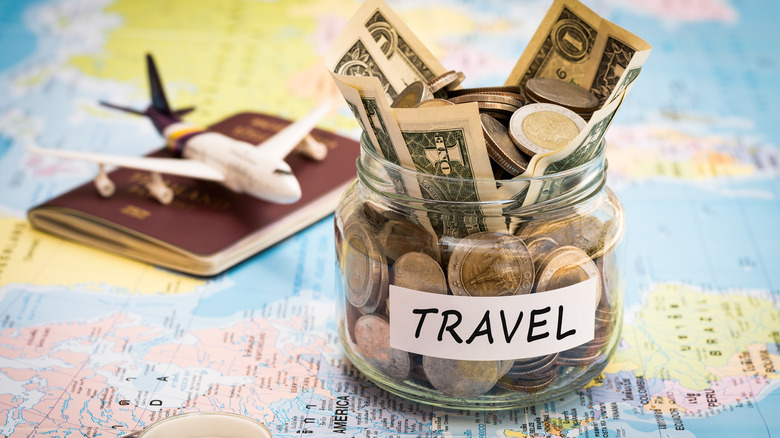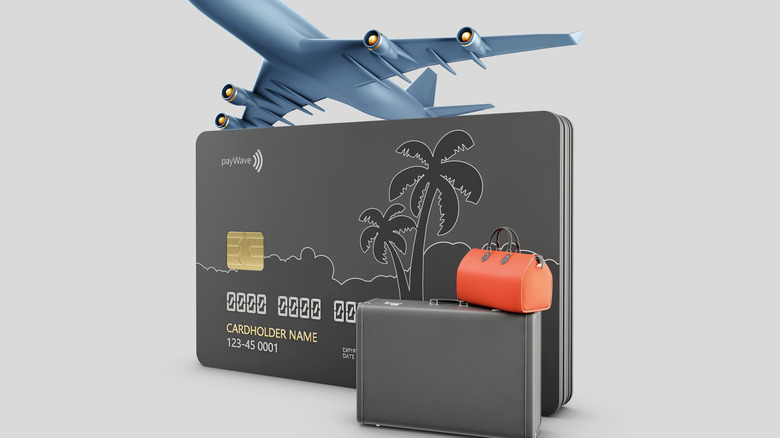Don't Spend More Than This Much Of Your Income On A Vacation
Predicting the exact cost of a vacation can be a difficult task for even the most fastidious financial planners. Lodging, airfare, and other transportation can be calculated fairly accurately, but what about restaurant meals and activities like tours and museums? Even trips that are billed as all-inclusive, like certain cruises and resorts, might not necessarily include extras like gratuities or souvenirs. According to the website CreditDonkey, which compares travel reward credit cards, you should "Consider adding a small 'unexpected costs' fund to your budget to avoid any mishaps. Even better, divide your unexpected costs fund into a per-day allowance to make sure you're ready for anything at any time."
So with that in mind, how much should you budget overall relative to your income for that dream vacation? There are a few good guidelines to follow, the first of which is the 50/30/20 rule of budgeting. Following the 50/30/20 rule, 50% of your after-tax income goes toward housing, utilities, groceries, and the other necessities of life. The 20% component refers to the amount of your income that you should be saving or investing, which leaves 30% for discretionary spending, which includes vacations.
That doesn't mean you'll be allowed to spend the entire 30% on a bucket list vacation, though. Discretionary spending also includes other "wants" like shopping for clothes or electronics, concerts, bars and restaurants, and gym memberships, so you'll need to balance at-home fun with reserving some of those funds for your ideal vacation.
Don't go into debt for your dream trip
If you're looking for a simpler way to figure out how much you'll have to spend for vacation annually, a common rule of thumb is 5% to 10% of your net (after taxes and other withholdings) income. For an earner with net income of $40,000 per year, that's $2,000 to $4,000 to spend on vacation, which can either be one big splurge or multiple more modest trips. Some consumers value travel more than others and may opt to spend more of their income, while perhaps saving on other "want" items at home like fewer restaurant meals or less expensive clothes.
Whichever guideline you choose to set a budget, you should never go into debt to pay for a vacation. Only commit to spending the money that you have in a checking or savings account and if you pay for travel expenses with a credit card, make sure that you're able to pay the bill in full when it comes due. The stress of accumulating debt, not to mention interest rates that can exceed 20%, will quickly offset the fun and relaxation of going on vacation to begin with and can add hundreds of dollars to the cost.
Credit card rewards can help pay
If you're sitting on a pile of airline miles or reward points from a credit card, consider using them to reduce the out-of-pocket cost of your vacation, especially the airfare portion. The downside is that figuring out how to extract maximum value from miles and points can be a daunting task with considerable research involved. Some travelers enjoy the challenge and the planning process, while others simply don't have the time to commit.
For the latter group, award booking services are available that will handle the heavy lifting for you after you describe the contents of your points portfolio. These services aren't free, but they might be worth the fee to avoid having to learn the nuances of various credit card and airline rewards programs. Money Digest hasn't personally vetted any of these services, but some popular names in that space are Points.me, Award Magic, and The Hub 'N Wifi.
Finally, if your supply of miles and points is looking a little low, consider opening a new credit card that offers a large initial travel bonus when a minimum spending threshold is met. Just don't be so eager to earn the bonus that you spend more than normal or more than you can afford to pay without carrying a balance. Try to use the card to spend on purchases that you would normally make anyway or pay a small fee to use the credit card to cover a mortgage or rent payment.


